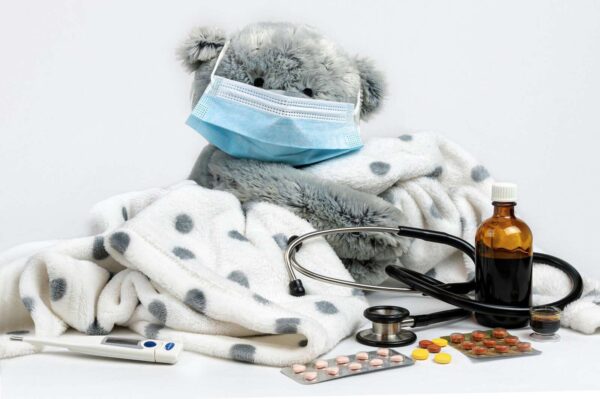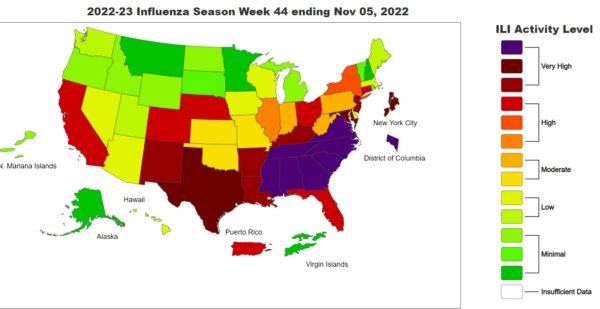
(Updated at 12:05 p.m.) Colds are in the air this winter, as a new COVID-19 variant has joined forces with the flu and RSV to produce a particularly challenging respiratory illness season.
Covid-related hospitalization levels remain low in Fairfax County, where 145 patients were admitted in the week that ended on Dec. 30 — a 46% increase from the previous week. But hospital visits and deaths are on the rise in Virginia and nationally, with the U.S. death toll exceeding 1.1 million people since the first case in 2020.
As of Tuesday (Jan. 9), 1,758 people have died from Covid in the Fairfax Health District, which includes the cities of Fairfax and Falls Church, according to the latest Virginia Department of Health data.
The district has had 23 COVID-19 deaths in the past 13 weeks — an increase from previous months, but overall, 2023 saw fewer deaths each month than previous years, according to the Fairfax County Health Department.
“The average age of the individuals who have passed due to COVID in the past 13 weeks is 80 years old and a third of these were associated with a long-term care or skilled nursing facility,” an FCHD spokesperson said. “Although COVID deaths are down from previous years, it does remain a threat in our communities and particularly for older populations with comorbidities.”
Now the most prevalent variant in the country, JN.1 appears to spread more efficiently than other forms of the coronavirus, but the vaccines updated last fall are still effective, though only 17.4% of residents have gotten those shots, the county health department said in an update yesterday.
According to the FCHD, Northern Virginia is experiencing a “very high intensity level” of influenza-like illnesses, which make up 6.7% of all emergency department and urgent care visits, led by young kids 4 and under. Inova reinstated a face mask requirement on Jan. 4 in response to the prevalence of respiratory illness.
The county health department says RSV (Respiratory Syncytial Virus Infection) activity is decreasing in the Fairfax Health District, but it’s still elevated elsewhere in the country, especially among young kids and older adults.
“If you are at high risk for severe illness from RSV, you should continue to take steps to protect yourself, especially if you are traveling or hosting a visitor,” the FCHD said.
The department is encouraging residents to get vaccinated against Covid and the flu and to take other steps to prevent spreading illness, including wearing a high-quality mask, covering coughs and sneezes and staying home when sick.
Photo via Kelly Sikkema on Unsplash

(Updated at 4:15 p.m.) While the wave of COVID-19 cases seen over the past two winters hasn’t yet materialized this year, increased reports of other respiratory illnesses have local hospitals and health officials bracing for a particularly tough cold season.
Fairfax County and other Northern Virginia public health leaders are urging community members “to maintain their vigilance” and help prevent the spread of influenza and respiratory syncytial virus (RSV), which are both surging earlier than usual.
“This is especially important because as temperatures cool, we spend more time indoors with others, and may travel to gather with friends and family for celebrations who are at increased risk of severe complications from infection,” the Northern Virginia Regional Commission (NVRC) said in a news release yesterday.
Inova activated its emergency plan to handle a surge in patients last month. The health care provider resumed normal operations on Nov. 8, but said “volumes continue to be high across the health system, particularly in pediatric services.”
HCA Healthcare, which owns Reston Hospital Center and Tysons Emergency, said its facilities in the area have also seen an increase in flu and RSV cases.
“We have been able to manage this increase in volume. We are increasing our staff and streamlining our processes in anticipation of a challenging winter season,” Reston Hospital Center Chief Medical Officer Dr. Carnell Cooper said.
Flu season is here
The Fairfax County Health Department confirmed that both flu and RSV cases have been rising locally.
“There is an increasing trend in visits to emergency departments and urgent care centers for influenza-like illness and laboratory results of confirmatory tests, and we have investigated a higher number of outbreaks than expected for this time of year,” the FCHD told FFXnow.
Virginia is seeing a very high level of activity for influenza-like illnesses (ILL), as of the week that ended Nov. 5, according to the Virginia Department of Health. The rating by the Centers for Disease Control and Prevention is based on outpatient visits to health care providers for respiratory illness involving a cough or sore throat and fever.

Per VDH, 9% of emergency department and urgent care center visits in the state are ILL-related, with kids 4 and younger making up 21.4% of visits — continuing a trend that health officials fear signals a worse flu season than in recent years, according to the NVRC.
While no deaths have been reported, Virginia has recorded 5,997 infections and 58 outbreaks so far this flu season, which started in mid-October and typically peaks between December and February.
“While it is unclear what exactly is driving this earlier increase in ILI activity from previous years, based on recent flu season reporting from the Southern Hemisphere, we anticipated this early peak to our own flu season,” the FCHD said.
County health officials recommends annual flu vaccinations for everyone 6 months and older. Shots are available from the county by appointment and at pharmacies, doctor’s offices and other locations in the community.
What to know about RSV
In addition to the disproportionate number of flu infections, young kids are getting hit hard by RSV, a common virus that produces usually mild, cold-like symptoms but “can be very dangerous for babies, young children or those who are immunocompromised,” the NVRC says.
“Emergency department and urgent care visits with diagnosed RSV have been increasing rapidly since early September,” the commission said. Read More

